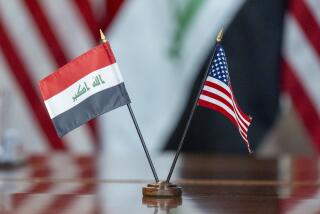U.S. Bases Grapple With Infiltration by Iraqi Fighters
- Share via
MOSUL, Iraq — The would-be assassins studied the colonel’s routine.
They carefully tracked the movements of his Humvee as it came and went at the U.S. military base in this northern city.
“They said they were going to put bombs outside the gates, because they knew I had to come in and out of the gates,” said Col. Joe Anderson, who commands about 5,000 troops occupying Mosul and surrounding towns.
Ultimately, the plot was foiled, its alleged ringleader arrested and the cell behind it broken up, Anderson said.
But the case underscores a fundamental dilemma facing U.S. authorities in Iraq.
The U.S. military here is dependent on thousands of Iraqi translators, contractors, laborers and others who toil at coalition bases and other official installations. Most have proved exceedingly loyal, U.S. officials stress. And most are happy to have relatively well-paying jobs in a nation whose war-ravaged economy offers sparse hope for many.
Yet some may be reporting back to the insurgents, perhaps for a price. That may be how those targeting Anderson learned his daily routine.
The issue of infiltration is one that confronts every occupation army fighting an insurgency.
“Those are always concerns in this kind of environment,” Lt. Gen. Ricardo Sanchez, the top U.S. military commander in Iraq, said Saturday at a Baghdad news conference. “We try to do the best we can to maintain a very close eye on those kinds of issues, because that possibility always exists ... given the numbers of Iraqis that we’re hiring for translation and support inside of our compounds.”
Officials do conduct basic background checks, although the Army has acknowledged great gaps in its intelligence about Iraq. Police officers and other security personnel who work closely with the military are vetted for past activities with Saddam Hussein’s Baath Party and military rankings.
Even the U.S.-trained Iraqi police force -- touted as perhaps the military’s greatest ally here -- has been found suspect. This summer, Marines in the central city of Najaf busted a ring of police officers allegedly organizing attacks on U.S. troops.
Sanchez said Saturday that other Iraqi police had been implicated in other anti-coalition violence.
“We have brought [the police] back on board; we’ve had great successes out of them,” the general said. “But at the same time, there have been incidents where the police have been conducting attacks against the coalition and working against the people. So that’s always a possibility. We remain very conscious of that -- and focused on ensuring that it doesn’t happen.”
Talk about possible insurgent infiltration of coalition sites has resounded in Iraq for months.
Speculation has focused on several high-profile incidents, starting with the August bombing of the United Nations headquarters in Baghdad. Among the 22 killed was Sergio Vieira de Mello, the U.N. chief here at the time. The truck -- carrying more than 1,000 pounds of military-grade munitions -- was parked on a side street within about 15 yards of Vieira de Mello’s office. Media speculation focused on the possibility that he was the target, with some theorizing that the attackers knew from informants where he was at the time.
But investigators tended to downplay the “inside job” scenario. One FBI official noted that the bomb-laden truck had been parked at the spot closest to the building. Security was later found to be seriously flawed at the U.N. compound.
Last month, talk of infiltration surfaced again when rockets hit Baghdad’s Rashid Hotel, which the coalition then used to house officials, visitors and civilian workers. Among the guests at the time was Deputy Defense Secretary Paul D. Wolfowitz, an architect of Washington’s Iraq policy, who was uninjured in the rocket barrage. A U.S. military officer was killed in the attack.
Officials here have since announced a number of arrests and said Wolfowitz’s presence was probably a coincidence.
In the case of Anderson, he said the Army got word of a plot aimed at him. “There was a cell actually targeting me specifically,” said Anderson, who is a well-known figure in Mosul, appearing often on TV and radio.
The would-be assailants were planning to go after the military commander as he jogged around the compound or as he went through the compound’s gates in his Humvee, Anderson said.
The suspected ringleader was identified as a former member of the Fedayeen Saddam, a paramilitary unit under the old regime.
“We’ve got some nasty guys -- some real McCoys, if you will,” Anderson said. “He’s behind bars, but he’s being very uncooperative.... Nothing we’re going to do is going to break this guy.”
More to Read
Sign up for Essential California
The most important California stories and recommendations in your inbox every morning.
You may occasionally receive promotional content from the Los Angeles Times.













